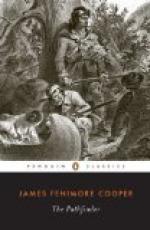While thus occupied, Mabel was suddenly alarmed by fancying that she caught a glimpse of a human form among the bushes that lined the shore of the island which lay directly before her. The distance across the water was not a hundred yards; and, though she might be mistaken, and her fancy was wandering when the form passed before her sight, still she did not think she could be deceived. Aware that her sex would be no protection against a rifle bullet, should an Iroquois get a view of her, the girl instinctively drew back, taking care to conceal her person as much as possible by the leaves, while she kept her own look riveted on the opposite shore, vainly waiting for some time in the expectation of the stranger. She was about to quit her post in the bushes and hasten to her uncle, in order to acquaint him of her suspicions, when she saw the branch of an alder thrust beyond the fringe of bushes on the other island, and waved towards her significantly, and as she fancied in token of amity. This was a breathless and a trying moment to one as inexperienced in frontier warfare as our heroine and yet she felt the great necessity that existed for preserving her recollection, and of acting with steadiness and discretion.
It was one of the peculiarities of the exposure to which those who dwelt on the frontiers of America were liable, to bring out the moral qualities of the women to a degree which they must themselves, under other circumstances, have believed they were incapable of manifesting; and Mabel well knew that the borderers loved to dwell in their legends on the presence of mind, fortitude, and spirit that their wives and sisters had displayed under circumstances the most trying. Her emulation had been awakened by what she had heard on such subjects; and it at once struck her that now was the moment for her to show that she was truly Sergeant Dunham’s child. The motion of the branch was such as she believed indicated amity; and, after a moment’s hesitation, she broke off a twig, fastened it to a stick and, thrusting it through an opening, waved it in return, imitating as closely as possible the manner of the other.
This dumb show lasted two or three minutes on both sides, when Mabel perceived that the bushes opposite were cautiously pushed aside, and a human face appeared at an opening. A glance sufficed to let Mabel see that it was the countenance of a red-skin, as well as that of a woman. A second and a better look satisfied her that it was the face of the Dew-of-June, the wife of Arrowhead. During the time she had travelled in company with this woman, Mabel had been won by the gentleness of manner, the meek simplicity, and the mingled awe and affection with which she regarded her husband. Once or twice in the course of the journey she fancied the Tuscarora had manifested towards herself an unpleasant degree of attention; and on those occasions it had struck her that his wife exhibited sorrow and mortification. As Mabel, however, had more than compensated for any pain she might in this way unintentionally have caused her companion, by her own kindness of manner and attentions, the woman had shown much attachment to her, and they had parted, with a deep conviction on the mind of our heroine that in the Dew-of-June she had lost a friend.




